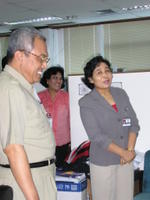
Dulu Rp 3.000 Dapat Lauk Telur, Sekarang...
By : MH SAMSUL HADI
Bagi pekerja kasar di Jakarta, seperti kuli proyek, dampak kenaikan harga bahan bakar minyak langsung terasa hingga perut. Pengurangan porsi makanan di warung telah mengubah pasokan gizi ke tubuh mereka.
Menyedihkan. Satu kata itulah yang pertama kali diucapkan Dirya (55), kuli proyek galian Telkom di Jalan Daan Mogot, Jakarta Barat, mengenai dampak kenaikan harga BBM yang dialaminya, Rabu (5/10).
Ekspresi wajahnya dingin, menunjukkan ketidakberdayaan rakyat kecil menghadapi kebijakan pemerintah.
Dulu (sebelum harga BBM naik Red) uang Rp 3.000 dapat lauk telur. Sekarang dengan uang segitu cuma sayur doang, lanjut pria asal Cirebon itu. Kalau mau telur, harganya jadi Rp 3.500 atau Rp 4.000, ujarnya lebih lanjut.
Seperti orang kebanyakan, urusan perut bagi kuli proyek adalah juga soal selera. Artinya, antara satu orang dan yang lain berbeda dalam memenuhinya. Hanya ada dua pilihan bagi kuli proyek dalam mengelola pengeluaran untuk makan sehari-hari, yakni tetap bertahan pada pengeluaran rutinnya atau mengikuti harga warung.
Dua pilihan itu sama-sama mengandung konsekuensi masing-masing. Dirya dan enam rekannya di Jalan Daan Mogot itu, misalnya, memilih ikut harga warung agar menu hariannya tidak berubah. Akibatnya, sebagian besar upahnya, Rp 30.000 per hari, terkuras untuk makan.
Kalau tidak begitu, badan cepat lemes. Kerja kurang semangat, ujar Dirya.
Wawan (30), rekannya, mengaku pernah mencoba irit dengan membeli makanan Rp 2.500 untuk seporsi. Tapi, tidak dilayani karena, kata penjual, belinya terlalu sedikit kata Wawan.
Pilihan mengikuti harga warung agar kebutuhan kalori tidak berubah tentu saja membuat pengeluaran mereka untuk makan meningkat drastis. Mereka mengaku Rp 25.000 habis untuk makan tiga kali sehari plus kopi dan rokoknya. Sarapan Rp 7.000, makan siang Rp 8.000, dan makan malam Rp 10.000.
Berbeda dengan Wakiman (40) dan Juli (35), kuli proyek penggalian saluran air Dinas Pekerjaan Umum (DPU) DKI di Jalan Medan Merdeka Timur, Jakarta Pusat. Keduanya memilih bertahan pada pengeluaran sebelum kenaikan harga BBM, yaitu Rp 3.000 sekali makan.
Risikonya, menu makanan jelas berubah, dari biasanya nasi sayur dengan lauk telur, kini hanya nasi sayur dengan tempe. Begitu paginya (harga) BBM naik, pagi itu pula harga makan di warung dan rokok ikut naik, kata Wakiman.
Pria asal Boyolali itu memerinci, seporsi nasi lauk tempe yang dulunya Rp 2.500 naik menjadi Rp 3.000 atau Rp 3.500; seporsi nasi lauk telur dari Rp 3.000 menjadi Rp 3.500; dan seporsi nasi lauk ikan tongkol dari Rp 3.500 menjadi Rp 4.000.
Banyak minum
Bukan itu saja yang membuat mereka puyeng. Nasi yang tadinya banyak, sepiring bisa penuh, sekarang agak berkurang. Dulu satu piring nasi sama seperti dua piring. Sekarang satu piring nasi seperti separo dari porsi normal, tutur Juli (35).
Padahal bagi umumnya kuli proyek, banyak-sedikitnya nasi sangat vital bagi tenaga mereka. Ibaratnya, meski dengan lauk ala kadarnya dan sambal, tidak menjadi masalah selama nasi banyak. Karena itu, berkurangnya nasi saat makan di warung- warung bagaikan musibah bagi mereka.
Untuk mengatasinya, Juli mengaku ia dan kawan-kawannya memperbanyak minum air putih, sebelum maupun sesudah makan. Maksudnya, agar cepat terasa kenyang dan memacu semangat kerja mereka, sekalipun sesudah itu lapar kembali. Kalau enggak mengirit, nanti Lebaran enggak bisa pulang. Bisa saja makan ayam atau ikan, tapi mungkin besoknya tidak bisa makan, tuturnya.
Selama bekerja di proyek itu, ia mengaku mendapat upah Rp 35.000 per hari. Pengeluaran makan plus rokoknya Rp 3.700 untuk sekali makan. Dengan makan tiga kali sehari, total anggaran untuk pos makan sehari-hari Rp 11.100. Itu belum termasuk kalau mau ngopi, beli es, atau sesekali pengin lauk telur atau ayam.
Harus lembur
Pilihan bertahan dengan pengeluaran lama, meski risikonya menu dan gizi menurun, juga dilakukan Turipno (21), Kentus (30), dan beberapa pekerja asal Lampung lainnya di proyek pemancangan tiang monorel di Jalan Rasuna Said, Kuningan, Jakarta Selatan.
Menurut Turipno, dengan upah Rp 27.000 per hari yang bisa diambil 20 hari sekali, mereka tidak punya cara lain, kecuali mengetatkan ikat pinggang (dalam arti yang sesungguhnya).
Sejak harga BBM dinaikkan pemerintah, Turipno dan rekan- rekannya terpaksa membatasi pengeluaran, yaitu Rp 3.000 untuk sekali makan. Mereka siap dengan risiko hanya makan nasi dengan lauk tempe. Bukan lauk telur, ikan, atau ayam, seperti yang mereka nikmati bulan lalu.
Sekarang kalau mau makan dengan lauk ikan atau ayam, harus menunggu lemburan dulu, kata Kentus (30). Kerja lembur bagi mereka adalah menambah jam kerja pada malam hari. Upah lembur itu ditetapkan Rp 3.500 per jam. Hanya saja, lembur itu tidak selalu ada setiap hari alias tidak bisa ditentukan.
Beban kerja para kuli proyek itu tetap, yakni bekerja pukul 08.00-17.00. Upah mereka pun tetap. Namun, harga makanan telah merangkak naik. Mereka bukan penerima dana kompensasi dan bukan pula pengguna transportasi yang langsung berurusan dengan BBM. Namun, dampak harga BBM yang mereka tanggung langsung menimpa perut mereka.
Link:
kompas.com







